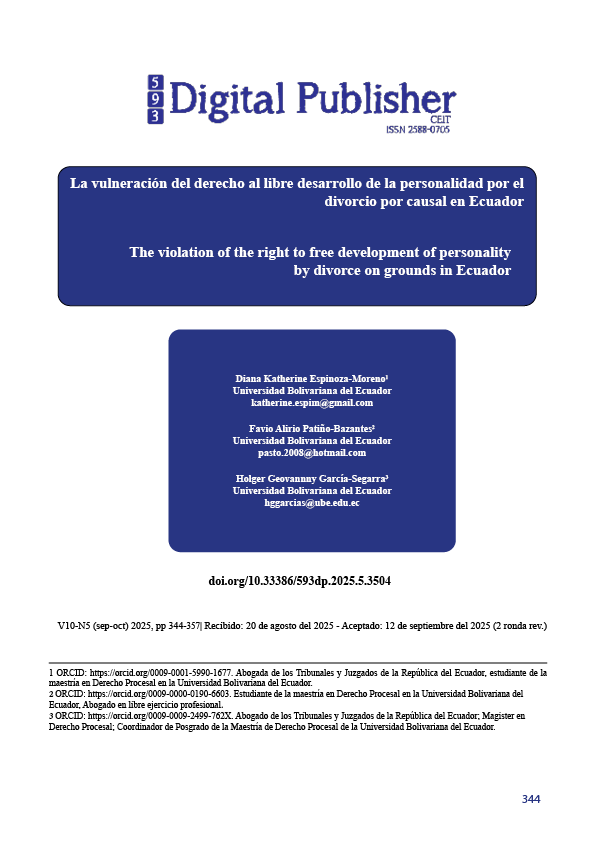La vulneración del derecho al libre desarrollo de la personalidad por el divorcio por causal en Ecuador
Contenido principal del artículo
Resumen
La institución jurídica del divorcio a lo largo del tiempo ha sido un tema trascendental y ampliamente discutido en las diferentes legislaciones de todo el mundo, la misma que afecta de manera directa a los individuos de una sociedad, su concepción y tratamiento ha estado en constante evolución a través del reconocimiento de diferentes derechos respecto del mismo, en el Ecuador existen dos modalidades para ejecutar la figura del divorcio, por mutuo acuerdo o por causal, el segundo debe justificar las circunstancias enmarcadas en la ley, por lo cual tiene un tratamiento contencioso debido a que implica un proceso en la vía civil para prosperar.
A través de esta investigación se busca como objetivo identificar la relación entre la posible vulneración al derecho al libre desarrollo de la personalidad contemplado en el artículo 66.5 de la Constitución de la República del Ecuador con respecto al divorcio por causal, de tal modo que se usará una metodología cualitativa, histórica, descriptiva, comparativa e inductiva, permitiendo evaluar como una causal para su disolución específica como lo es la infidelidad, maltrato, abandono, entre otras, podría violar derechos establecidos en la Constitución del Ecuador, principalmente el libre desarrollo de la personalidad, ya que en muchos casos no es posible comprobar la causal y la pareja se ve en la obligación de continuar con el vínculo matrimonial, por aquello es imperativo analizar el impacto de la voluntad individual con respecto a la disolución del vínculo matrimonial bajo este contexto.
Descargas
Detalles del artículo

Esta obra está bajo una licencia internacional Creative Commons Atribución-NoComercial-CompartirIgual 4.0.
1. Derechos de autor
Las obras que se publican en 593 Digital Publisher CEIT están sujetas a los siguientes términos:
1.1. 593 Digital Publisher CEIT, conserva los derechos patrimoniales (copyright) de las obras publicadas, favorece y permite la reutilización de las mismas bajo la licencia Licencia Creative Commons 4.0 de Reconocimiento-NoComercial-CompartirIgual 4.0, por lo cual se pueden copiar, usar, difundir, transmitir y exponer públicamente, siempre que:
1.1.a. Se cite la autoría y fuente original de su publicación (revista, editorial, URL).
1.1.b. No se usen para fines comerciales u onerosos.
1.1.c. Se mencione la existencia y especificaciones de esta licencia de uso.
Citas
Castañeda, M. H. (2025). Propuesta legal de una vía procedimental diferente-un proceso. Obtenido de file:///C:/Users/Patricio%20Espinoza/Downloads/Huangal_CM.pdf
Chávez, M., Machado, E., & Anderson, S. (2025). El divorcio sin causal en Ecuador y el pleno desarrollo de los menores de edad. Obtenido de http://dspace.unach.edu.ec/handle/51000/15507
Código Civil. (2005). De la terminación del matrimonio. Obtenido de https://webhistorico.epn.edu.ec/wp-content/uploads/2015/06/Codigo-Civil1.pdf
Constitución de la República del Ecuador. (2008). Derechos de libertad. Obtenido de https://www.defensa.gob.ec/wp-content/uploads/downloads/2021/02/Constitucion-de-la-Republica-del-Ecuador_act_ene-2021.pdf
Corte Constitucional del Ecuador. (14 de Febrero de 2025). Obtenido de https://strapi.lexis.com.ec/uploads/9d53fcb1_1669_466b_8445_6bf9dfee670c_a9901815d0.pdf
Corte Constitucional del Ecuador. (21 de diciembre de 2021). Obtenido de https://esacc.corteconstitucional.gob.ec/storage/api/v1/10_DWL_FL/e2NhcnBldGE6J3RyYW1pdGUnLCB1dWlkOic0MDAxNDkwNi0wNDAzLTRlOWQtYWRmYi0wYjJlNzJhNTNhMDYucGRmJ30
Corte Nacional de Justicia. (10 de febrero de 2015). Obtenido de https://vlex.ec/vid/594179618
Cruz Rico, E. A. (mayo de 2021). Las causales del divorcio y derecho fundamental al libre desarrollo de la personalidad: Un análisis crítico. Obtenido de https://repository.ucc.edu.co/server/api/core/bitstreams/b06e81d6-732a-4d7c-93e2-5ce98bb4690f/content
Eguiluz, L. (1993). Las mujeres y el divorcio, una visión de género. Obtenido de https://scholar.google.com/scholar?hl=es&as_sdt=0%2C5&q=una+persona+no+se+casa+para+divorciarse&btnG=
Freire, K. F. (2020). La violencia contra la mujer como causal de divorcio y la vulneración delderecho a la intimidad personal y familiar. Obtenido de http://dspace.unach.edu.ec/jspui/bitstream/51000/7457/1/8.TESIS%20KAREN%20FIALLOS%20FREIRE-DER.pdf
Guamán Quinzo, C., & Hernández, N. (2024). Modificación del Código Civil ecuatoriano para incrementar el reconocimiento del divorcio incausado. Obtenido de https://revistalex.org/index.php/revistalex/article/view/362/873
INEC. (2024). Instituto Nacional de Estadística y Censos. Obtenido de https://www.ecuadorencifras.gob.ec/documentos/web-inec/Poblacion_y_Demografia/Matrimonios_Divorcios/2024/Principales_resultados_MYD_2024.pdf
Núñez, Dávila, S. (2021). Divorcio incausado: una. Obtenido de file:///C:/Users/Patricio%20Espinoza/Downloads/usfqlawreview,+Divorcio+incausado+-+una+urgente+actualizaci%C3%B3n+normativa.pdf
Rousseau, J. J. (1998). El contrato social. Obtenido de https://www.penguin.com.au/books/the-social-contract-9780140442014
Sierra, I. J. (2020). Daños Matrimoniales: Hacía una Teoría de la Responsabilidad CivilContractual en elDivorcio. Obtenido de https://repositorio.uniandes.edu.co/server/api/core/bitstreams/a28c4e1b-a917-4886-b534-f6033fac2c7f/content
Tejada Rodríguez, E. E. (2018). El convenio regulador sobre los efectos del divorcio incausado en el ordenamiento jurídico argentino. Obtenido de https://repositorio.21.edu.ar/server/api/core/bitstreams/04999878-c1e2-48cd-8c58-61c94ae42146/content




